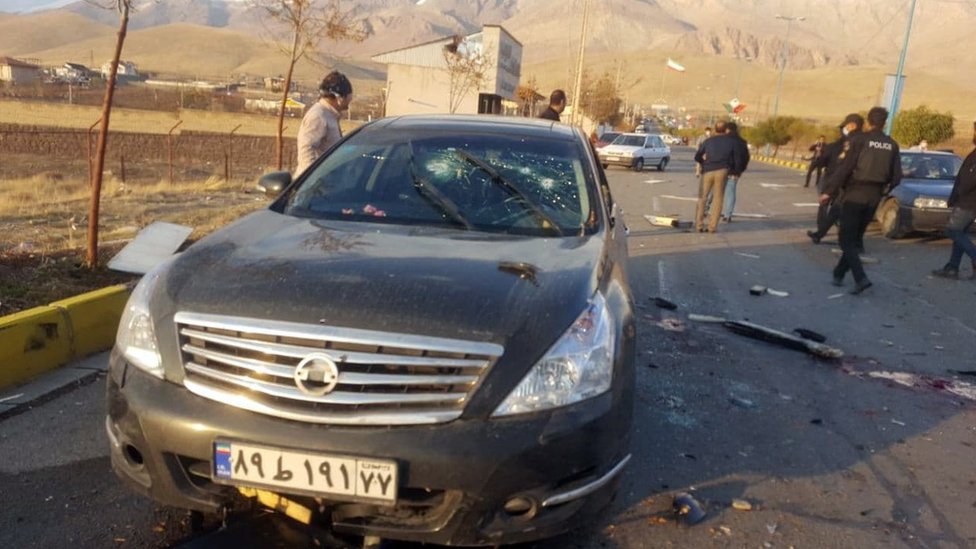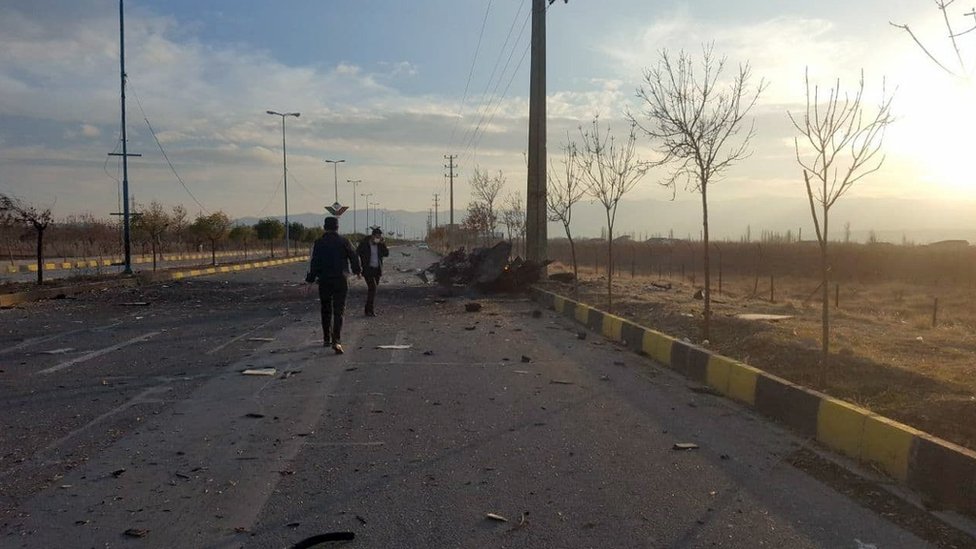
Iran's most senior nuclear scientist Mohsen Fakhrizadeh has been assassinated near the capital Tehran, the country's defence ministry has confirmed.
Fakhrizadeh died in hospital after an attack in Absard, in Damavand county.
Iran's Foreign Minister Mohammad Javad Zarif, has condemned the killing "as an act of state terror".
Western intelligence agencies view Fakhrizadeh as being behind Iran's covert nuclear weapons programme.
"If Iran ever chose to weaponise (enrichment), Fakhrizadeh would be known as the father of the Iranian bomb," one Western diplomat told Reuters news agency in 2014.
News of the killing comes amid fresh concern about the increased amount of enriched uranium that Iran is producing. Enriched uranium is a vital component for both civil nuclear power generation and military nuclear weapons.
Iran insists its nuclear programme is exclusively for peaceful purposes.
Between 2010 and 2012, four Iranian nuclear scientists were assassinated and Iran has accused Israel of complicity in the killings.
Fakhrizadeh's name was specifically mentioned in Israeli PM Benjamin Netanyahu's presentation about Iran's nuclear programme in May 2018.
What happened to Mohsen Fakhrizadeh ?
In a statement on Friday, Iran's defence ministry said: "Armed terrorists targeted a vehicle carrying Mohsen Fakhrizadeh, head of the ministry's research and innovation organisation.
"After a clash between the terrorists and his bodyguards, Mr Fakhrizadeh was severely injured and rushed to hospital.
"Unfortunately, the medical team's efforts to save him were unsuccessful and minutes ago he passed away."

Iranian media reports said the attackers opened fire on the scientist in his car.
Fars news agency earlier reported there was a car explosion in Absard town, with witnesses reporting that "three to four individuals, who are said to have been terrorists, were killed".
What has the reaction been?
"Terrorists murdered an eminent Iranian scientist today," Iran's foreign minister said in a tweet.
"This cowardice - with serious indications of Israeli role - shows desperate warmongering of perpetrators."
Mr Zarif called on the international community to "condemn this act of state terror".
Iran's government congratulated Fakhrizadeh on his "martyrdom".
🔹محمد جواد ظریف وزیر امور خارجه جمهوری اسلامی ایران با صدرو بیانیه ای اقدام تروریستی و کوردلانه ترور شهید محسن فخری زاده رییس سازمان پژوهش و نوآوری وزارت دفاع جمهوری اسلامی ایران توسط تروریستها را به شدت محکوم کرد.https://t.co/kSvLoCGMTb pic.twitter.com/3zj2ZkAbaB
— پاد (@PadDolat) November 27, 2020
The commander of the Islamic Revolutionary Guard Corps (IRGC) has said that Iran will revenge the killing of the scientist.
"Assassination of nuclear scientists is the most obvious violation of the global hegemony to prevent our access to modern sciences," said Major General Hossein Salami.
There has been no comment from Israel on the news of the assassination. The Pentagon has also declined to comment, according to Reuters.
Who was Mohsen Fakhrizadeh?
Fakhrizadeh is the most renowned Iranian nuclear scientist and a senior officer of the elite Islamic Revolutionary Guard Corps.
He has long been spoken about by Western security sources as extremely powerful and instrumental in Iran's nuclear programme.
According to secret documents obtained by Israel in 2018, he led a programme to create nuclear weapons.
"Remember that name," Israeli Prime Minister Benjamin Netanyahu said as he identified Fakhrizedeh as the head scientist in the programme.
In 2015, the New York Times compared him to J. Robert Oppenheimer, the physicist who directed the Manhattan Project that during World War Two produced the first atomic weapons.
Fakhrizadeh was born in 1958 in city of Qom, Iran, according to a 2011 report published by Iranian opposition group, the National Council of Resistance of Iran (NCRI).
A professor of physics, he is said to have led Project Amad, the alleged covert programme that was established in 1989 to research the potential for building a nuclear bomb. It was shut down in 2003, according to the International Atomic Energy Agency (IAEA).
https://news.google.com/__i/rss/rd/articles/CBMiNWh0dHBzOi8vd3d3LmJiYy5jby51ay9uZXdzL3dvcmxkLW1pZGRsZS1lYXN0LTU1MTA1OTM00gE5aHR0cHM6Ly93d3cuYmJjLmNvLnVrL25ld3MvYW1wL3dvcmxkLW1pZGRsZS1lYXN0LTU1MTA1OTM0?oc=5
2020-11-27 15:38:00Z
52781210901850
Tidak ada komentar:
Posting Komentar